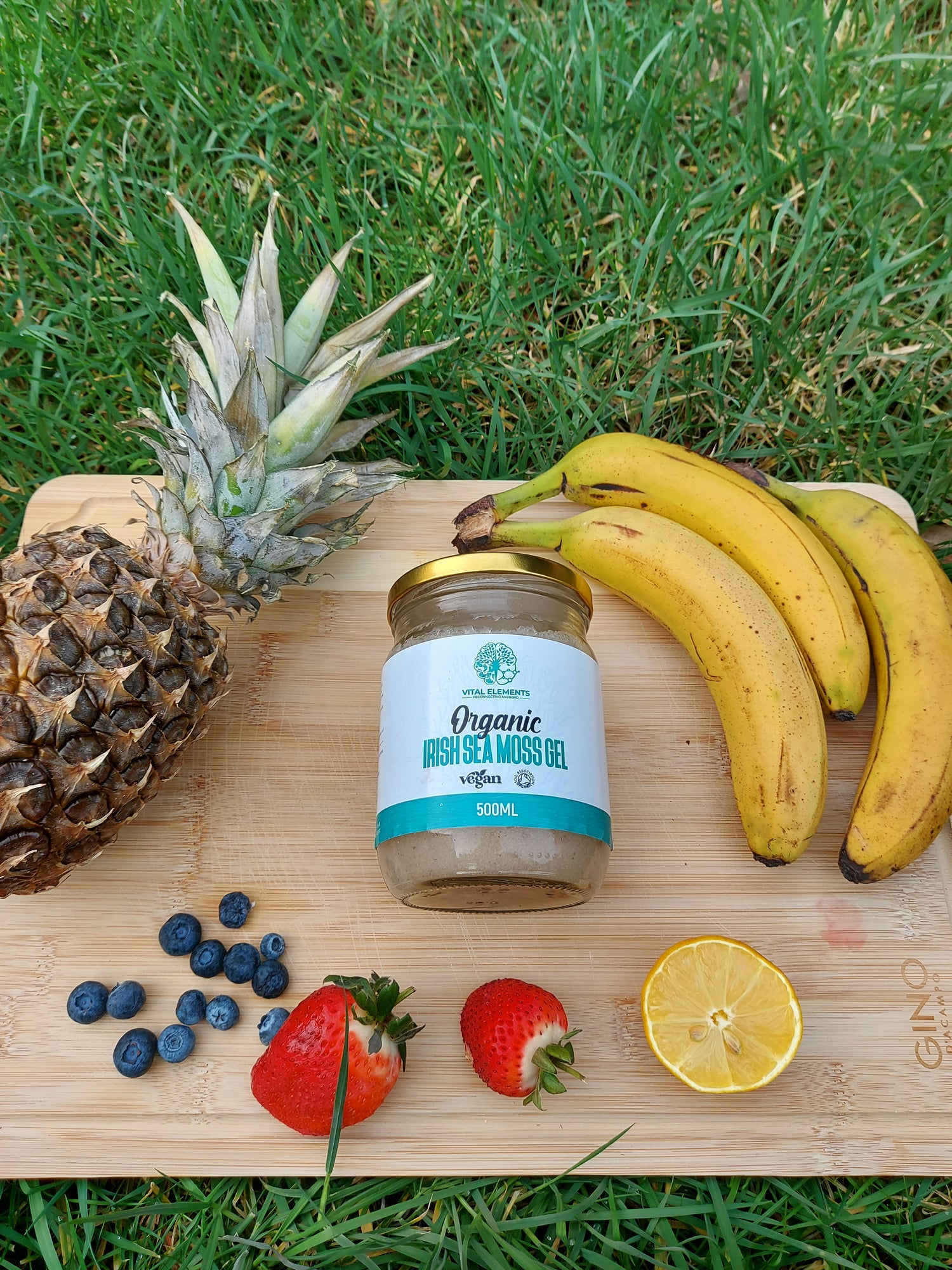
Explore the Power of Irish Sea Moss Gel
Health Benefits
Chondrus crispus is considered as a cold water and euryhaline species and grows on rocks in shallow water, . It can also grow in pools of water in the mid-tide zone, especially in areas where the tide is exposed to the open ocean. Chondrus crispus is found widely in the north-western and north-eastern Atlantic. While some reports suggest it may be found from California to Japan, these claims are likely due to confusion with similar species, and its presence outside the Northern Atlantic needs further verification.
Our Irish Moss is authentic and should not be confused with Caribbean Sea Moss, which grows on ropes, not rocks. Often mislabelled as "Irish Sea Moss" due to cultural misunderstanding, it is less nutrient-dense than cold-water Irish Moss. Our Irish Sea moss derives from Western Ireland and was in fact used during the Irish potato famine.
Here are some of the benefits of our Irish Sea Moss Gel:
- Supports Gut Health: Acts as a prebiotic, enriching beneficial gut bacteria and improving digestion.
- Boosts Immunity: Contains compounds like kappa-carrageenan that enhance immune response.
- Rich in Antioxidants: Fights free radicals, helping reduce oxidative stress and support overall wellness.
- Anti-Inflammatory: Helps reduce inflammation by inhibiting excess nitric oxide productions.
- Promotes Brain Health: Provides neuroprotective benefits and reduces oxidative stress linked to ageing.
- Natural Antimicrobials: Helps combat harmful bacteria and yeast.
- Antiviral Properties: Studies demonstrate effectiveness against viruses.
- Supports Healthy Circulation: Contains natural anticoagulant properties to aid blood flow
- Reduce Cholesterol & Glucose Levels: Contains soluble fibres to help decrease blood cholesterol and glucose levels.
Sea Moss & The Science
Take a read below of the elements and their benefits found in a jar of Irish Sea Moss gel
Calcium: This mineral is the 5th most abundant element in the body and is essential for proper cardiac function, the structural integrity of both bones and teeth, muscular contraction. Appropriate calcium intake has shown many health benefits, such as reduction of hypertensive disorders of pregnancy, lower blood pressure particularly among young people, prevention of osteoporosis and colorectal adenomas, lower cholesterol values
Iron: Iron is an essential element for almost all living organisms and more than 1.2 billion people display iron deficiency worldwide. It participates in a wide variety of metabolic processes, including oxygen transport, DNA synthesis, and aids in contributing to energy production
Potassium: Potassium is the main electrolytes in the body and is principally involved in the electrical excitation of both nerve and muscle cells, which allows communication throughout the body
Magnesium: Magnesium is a vital mineral playing a key role in over 300 enzyme systems. It supports protein synthesis, muscle and nerve function, blood glucose control, and blood pressure regulation. Magnesium is essential for energy production, bone development, DNA and RNA synthesis, and the antioxidant glutathione. It also aids in the transport of calcium and potassium ions, crucial for nerve conduction, muscle contraction, and heart rhythm
Phosphorous: Phosphorus, an essential nutrient, performs vital functions in skeletal and non-skeletal tissues and is pivotal for energy production. It is needed for the body to make protein for the growth, maintenance, and repair of cells and tissues.
Manganese: Manganese is essential for numerous vital process including nerve and brain development and cognitive functioning. It also helps enzymes do their job within the body. Interestingly, it can also take on the tasks of magnesium due to the similarities in their structure.
Copper: Copper is an essential nutrient in the body that you need to stay healthy. Your body uses copper to carry out many important functions, including making energy, connective tissues, and blood vessels. It also helps to maintain the nervous and immune systems and activates genes. Your body also needs copper for brain development. Copper is also important in melanin production which gives your hair its colour.
Selenium: Selenium is essential for the body, as it forms selenoproteins that help protect against oxidative damage. These selenoproteins also support thyroid hormone metabolism, reproductive health, and provide neuroprotective benefits. Low selenium status has been associated with an increased risk of mortality, poor immune function, cognitive decline, and thyroid dysfunction.
Zinc: Zinc is involved in many aspects of cellular metabolism. It is required for the catalytic activity of hundreds of enzymes, and it plays a role in enhancing immune function, protein and DNA synthesis, wound healing, and cell signaling and division. Zinc also supports healthy growth and development during pregnancy, infancy, childhood, and adolescence and is involved in the sense of taste
Iodine: Iodine is a trace element and is an essential component of the thyroid hormones thyroxine (T4) and triiodothyronine (T3). Thyroid hormones regulate many important biochemical reactions, including protein synthesis and enzymatic activity, and are critical determinants of metabolic activity. They are also required for proper skeletal and central nervous system development in foetus and infants
Vitamin A: Vitamin A is involved in immune function, cellular communication, growth and development, and male and female reproduction. Vitamin A supports cell growth and differentiation, playing an essential role in the normal formation and maintenance of the heart, lungs, eyes, and other organs. Vitamin A is also critical for vision.
Vitamin B: B vitamins are a group of eight nutrients the body requires every day because it does not store them. They help turn food into energy and support important functions like brain health, nerve function, and cell growth. Since they play a key role in keeping nerves and cells healthy, a lack of B vitamins can lead to health problems, including nerve and brain disorders. Older adults and others who don’t absorb nutrients well may need to pay extra attention to their B vitamin intake. In fact, a study shown that taking B vitamins for at least 4-weeks helped to elevate mood.


Discover Our Story
From passion to product – see how our journey with Irish Sea Moss began
